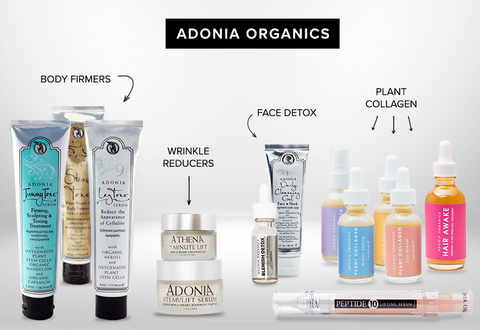
Vitamins and Your Skin
When it comes to skin health, we often focus on the latest creams, serums, or facials promising a youthful glow. But what if the secret to great skin isn't just in what you put on your body, but also what you put in it? The relationship between vitamins and skin health is more crucial than many realize. Vitamin deficiencies can lead to a host of skin problems that even the best skincare products won’t fix.
Let’s dive into the vital role vitamins play in maintaining your skin’s health and what can happen when your body lacks these essential nutrients.
Vitamin A Deficiency: Dull, Dry Skin

Vitamin A, commonly known for its potent skincare cousin retinol, plays a huge role in skin cell production and repair. It’s like the fuel that keeps your skin's rejuvenation engine running.
Effects of Vitamin A Deficiency on Skin:
- Dry, flaky skin: Without enough vitamin A, your skin’s ability to produce fresh, new cells slows down, leading to rough patches and a dull, lackluster complexion.
- Keratosis pilaris: Ever noticed small, rough bumps on the backs of your arms or thighs? This condition, also known as "chicken skin," can result from a lack of vitamin A.
- Increased acne: Vitamin A regulates sebum production and helps skin shed dead cells efficiently. A deficiency can lead to clogged pores and an increase in breakouts.
To keep your skin supple and smooth, aim to include vitamin A-rich foods like carrots, sweet potatoes, and spinach in your diet, or consider supplements if you think you’re running low.
Vitamin C Deficiency: Sagging and Premature Aging

Vitamin C is best known for its immune-boosting powers, but it’s also a superhero for your skin. As an antioxidant, it helps protect the skin from harmful UV damage and pollution, while also aiding in collagen production.
Effects of Vitamin C Deficiency on Skin:
- Slower healing of wounds: If you’ve noticed that your cuts or scrapes are taking longer than usual to heal, it could be due to a lack of vitamin C.
- Premature wrinkles and sagging: Without enough vitamin C, collagen production drops, which can result in skin losing its elasticity and firmness.
- Hyperpigmentation and dark spots: Vitamin C helps to fade dark spots and even out skin tone. A deficiency can exacerbate sun damage, leading to more visible dark patches or uneven skin.
Citrus fruits, bell peppers, and berries are great natural sources of vitamin C. For extra skin benefits, many people also incorporate vitamin C serums into their skincare routine.
Vitamin D Deficiency: Itchy, Inflamed Skin

Vitamin D is often called the "sunshine vitamin" because your skin produces it when exposed to sunlight. It plays a crucial role in skin barrier function and immune system support.
Effects of Vitamin D Deficiency on Skin:
- Psoriasis flare-ups: Low levels of vitamin D can exacerbate chronic skin conditions like psoriasis, causing red, scaly patches on the skin.
- Dryness and sensitivity: Without sufficient vitamin D, the skin's protective barrier can weaken, leading to dry, irritated, and more sensitive skin.
- Increased risk of infections: Vitamin D helps boost the immune system's response to bacteria and viruses, so when it’s lacking, the skin may become more prone to infections like eczema and acne.
To ensure adequate vitamin D levels, spend time outdoors in the sunlight or include vitamin D-rich foods like fatty fish, fortified milk, and mushrooms in your diet.
Vitamin E Deficiency: Dehydrated Skin and Premature Aging

Vitamin E is a powerful antioxidant that protects your skin from free radical damage. It also helps maintain moisture levels, keeping skin hydrated and youthful-looking.
Effects of Vitamin E Deficiency on Skin:
- Dry, flaky skin: Without enough vitamin E, your skin may lose moisture more easily, leading to dehydration and a dry, flaky texture.
- Faster aging: Free radicals from sun exposure and pollution can accelerate the aging process, leading to more fine lines and wrinkles. A lack of vitamin E reduces your skin’s ability to fend off these environmental aggressors.
- Scarring: Vitamin E plays a role in wound healing and reducing the appearance of scars. A deficiency can result in slower healing and more visible scar tissue.
Incorporate vitamin E into your diet by eating foods like nuts, seeds, and avocados. You can also apply it topically in oils or creams for an extra moisture boost.
Vitamin K Deficiency: Dark Circles and Bruising

Vitamin K is essential for blood clotting, which directly impacts your skin’s ability to heal and maintain its even tone.
Effects of Vitamin K Deficiency on Skin:
- Dark under-eye circles: Poor blood circulation can lead to visible blood vessels under the thin skin around the eyes, causing dark circles to appear more prominent.
- Bruising easily: If you notice that your skin bruises at the slightest bump or scratch, it could be due to a lack of vitamin K, as it helps strengthen blood vessels.
- Poor wound healing: Like vitamin C, vitamin K is crucial for helping your skin heal wounds and recover from damage.
Leafy greens like kale and spinach are excellent sources of vitamin K, and adding them to your diet can help brighten up your complexion and improve overall skin resilience.
B Vitamins: Cracked Lips and Red, Irritated Skin

The B vitamins are a group of eight essential nutrients that work in harmony to keep your skin healthy. Among them, niacin (B3) and biotin (B7) are particularly important for skin health.
Effects of B Vitamin Deficiency on Skin:
- Cracked lips and dry skin: A lack of B vitamins, particularly niacin, can cause dry, cracked lips and a rough skin texture.
- Redness and irritation: Without enough B vitamins, the skin barrier can weaken, leading to increased sensitivity, redness, and irritation.
- Hyperpigmentation: Deficiencies in certain B vitamins, like B12, can cause uneven skin tone and dark spots.
Whole grains, eggs, and meat are excellent sources of B vitamins, and maintaining balanced levels can keep your skin smooth, hydrated, and irritation-free.
Topical Products Can Speed the Healing
Topical products like those from Adonia Organics can offer immediate relief and enhancement, but remember, true skin health starts from within. Vitamins are essential building blocks for maintaining the skin’s structure, moisture, and defense mechanisms. If you notice persistent skin issues, consider looking at your diet. It’s amazing how much of an impact proper nutrition, especially vitamin intake, can have on your complexion.

